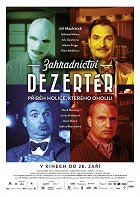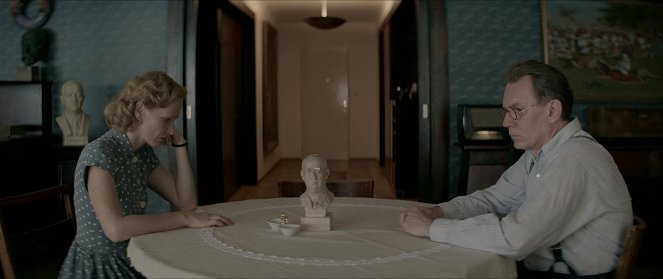Regie:
Jan HřebejkDrehbuch:
Petr JarchovskýKamera:
Bartek CierlicaMusik:
Petr OstrouchovBesetzung:
Jiří Macháček, Gabriela Míčová, Aňa Geislerová, Martin Finger, Klára Melíšková, David Novotný, Lenka Krobotová, Karel Dobrý, Sabina Remundová (mehr)Inhalte(1)
The ZAHRADNICTVÍ (GARDEN STORE) trilogy consists of three separate films, all taking place in Czechoslovakia, set against the backdrop of some of the most dramatic periods of the past century (1939-1959), starting with WWII, covering the period of post-war optimism, and ending with the rise of the Communist dictatorship. It tells the story of three related families: the family of an air radio operator, the family of the owner of a hair salon, and the family of a garden store owner. The trilogy encompasses twenty years of the lives of its characters, who had to live out the best years of their lives in these complicated times.
DEZERTÉR (DESERTER) is a drama that takes place from 1947 to 1953, during the time when the Communists first seized power. The main character, one of the returned fathers, is the owner of the stylish Valentino Hair Salon in the center of Prague. He employs his entire family at his business, which is the purpose and fulfilment of his life. The film is the story of men who risked their lives in the battle for freedom. They survived the threat of death only to once again face the loss of the hopes in which they believed and to which they had become emotionally attached. Each of them is trying to find a "home" again. THE DESERTER is a tragicomic drama of severely tested love between husbands and wives, between siblings, and between parents and their children. (CinemArt)
(mehr)Kritiken (5)
Während ich in A Family Friend bereits eine Reihe von Qualitäten für künftige zahlreiche Wiederholungen erkennen kann - denn es handelt sich um ein leichteres melodramatisches Genre - bin ich bei Deserter vorsichtiger. Auch hier sind die Qualitäten stark, aber ein so intimes und rohes Drama ist nicht wirklich ein Spaziergang im Garten Eden und es ist für den Zuschauer schwierig, die grotesken und rohen Situationen immer wieder zu erleben. Alle Details und das Gesamtgefühl der dramatischen Bögen und menschlichen Schicksale sind pikant. Indem er zum Beispiel Zuzana Mauréry einfach eine Nebenrolle in einer Teilanekdote in einem Friseursalon gibt, setzt Hřebejk bereits den Ton für die ganze Szene, aber er scheut sich nicht, die Komödienfolge bittersüß zu halten, was sehr wertvoll ist. Es wäre sehr falsch gewesen, aus diesen Jahren des Umbruchs eine reine Komödie zu machen. Danke, ich freue mich auf den Abschluss der Trilogie.
()
I enjoyed the first part of the trilogy, but I had some reservations. This time, I have none. In terms of acting, direction, and writing, Deserter is simply a great movie. I have never seen Jiří Macháček act this well before, Martin Finger confirmed that he’s one of the best contemporary actors, and Gabriela Míčová also got a great opportunity, which she did not waste. The other characters – and there are a lot – aren't just numbers this time, or at least they don't seem to be, and in the end everything fits together and you look forward to the next film. That's how it should be.
()
Nach einem schrecklichen ersten Teil ein riesiger Aufschwung, obwohl ich nach fünfzehn Minuten ein Déja-vue mit dem Weihnachtsbaum erlebte. Glücklicherweise entwickelte sich die Handlung sehr schnell, und es durften auch rein groteske Momente nicht fehlen. Ein wirklich gelungener Film, es spielen dieselben Schauspieler, derselbe Regisseur, und das Ergebnis ist völlig anders. Ich bin gespannt auf den abschließenden Teil.
()
Hřebejk and Jarchovsky's idea of how to make a "major motion picture" where characters are ruthlessly transformed against the backdrop of brutal history. It's just a shame that you giggle like a madman the whole time, because this artsy drunkenness is fantastically accelerated by the totally obscene (mis)direction and the inept script. Hřebejk clearly has no say at all in how the performers are supposed to conceptualise their characters, so they go to all sorts of lengths to build strong personalities. Machacek's "dramatic transformation", which forces him to alternate between several acting jobs, where he easily outstrips everyone by a wide margin, is perhaps somewhat reminiscent of Bruno Dumont. Jarchovsky hasn't had a clue how people talk to each other for a good ten years now; in my opinion, he doesn't read anything he didn’t write himself, but that doesn't stop him from writing epic historical pieces about how the sleazy Štěpán Kozub, who throws rocks at girls and doesn't want to work (because he's a communist!!), is stealing stuff from a nice, quirky gentleman with a moustache and a coffee machine. It's insane, really, it's almost impossible to watch, but for some reason this creative team manages to keep a close watch over the design and the camera the entire time, so I can't bury it too deep. Besides... well, thanks to the above, I actually had fun with it.
()
"I'm starting to feel that Jan Hřebejk understands the period of communism or its aftermath a little better than the period of Nazism. The characters are portrayed slightly better here, there is a bit better humor than in the first part of the trilogy, but it still falls short of something better than the average rating. This doesn't become a classic."
()

